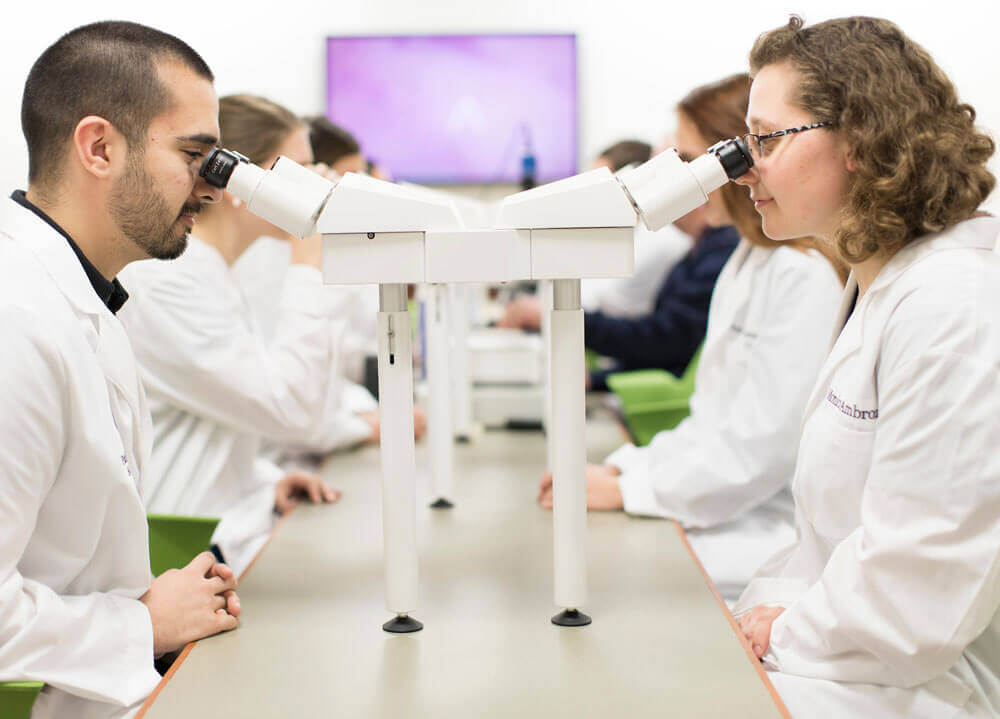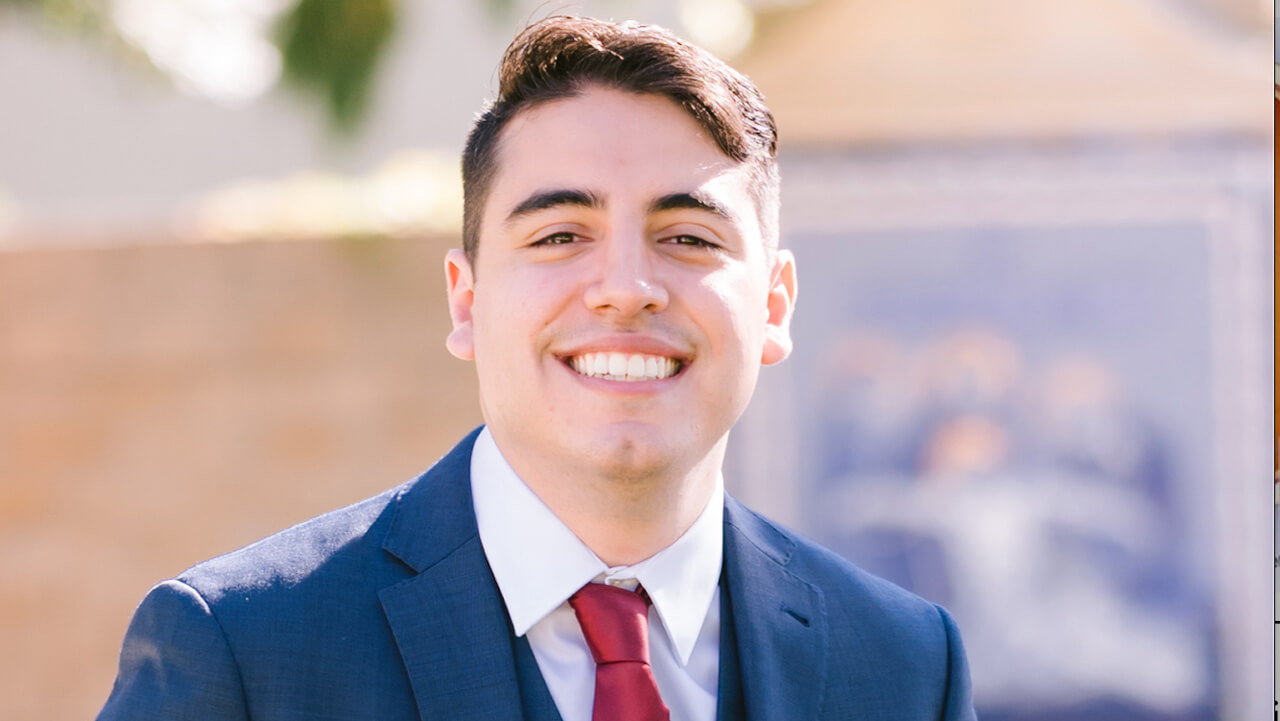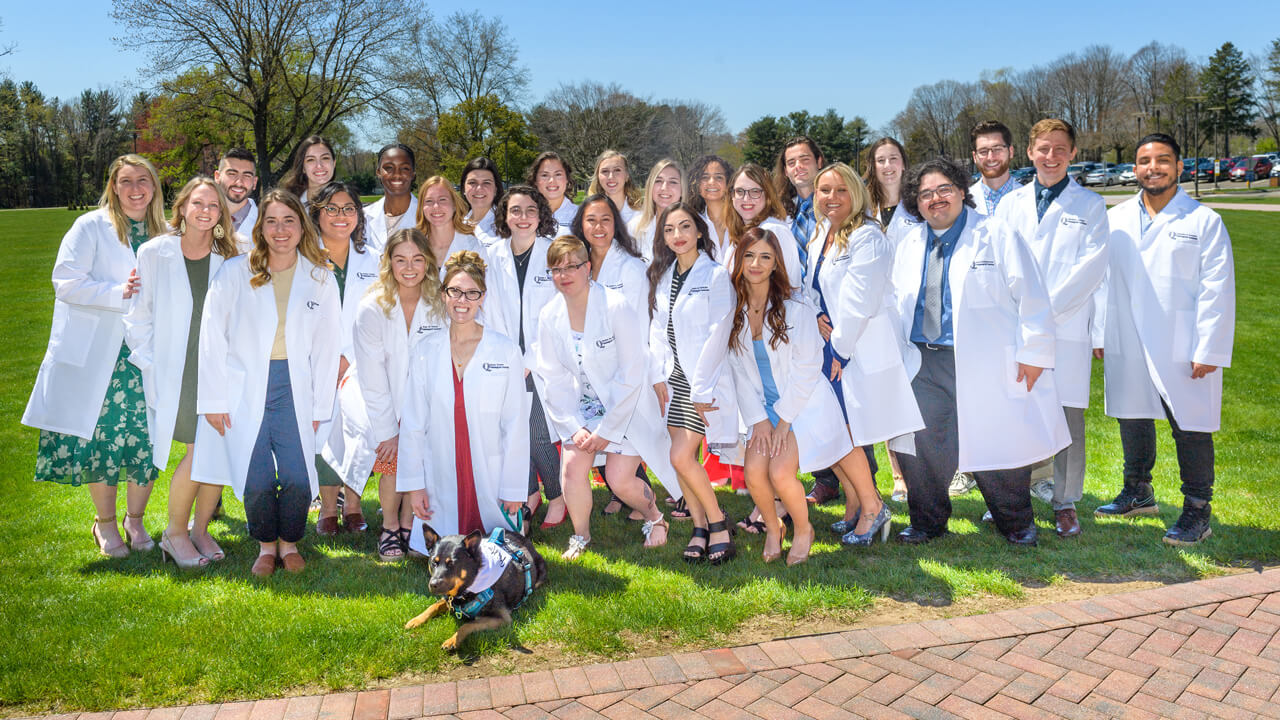
Pathologists’ assistants combine profound knowledge of human anatomy and disease systems with clinical procedural skills to help a pathologist diagnose diseases, assist in autopsies and ensure successful treatment for all patients.


Pathologists’ assistants combine profound knowledge of human anatomy and disease systems with clinical procedural skills to help a pathologist diagnose diseases, assist in autopsies and ensure successful treatment for all patients.

As a pathologists’ assistant, you’ll uncover the many factors preventing the healthy function of organs and body systems. Our NAACLS-accredited program — one of only 15 of its kind in the U.S. and Canada — teaches you to examine, process and prepare tissue specimens for a variety of clinical tests and procedures. The skills you acquire place you in high demand in hospitals, clinical laboratories, research and medical teaching facilities.
Our program emphasizes a strong foundation in the theory and application of anatomical, surgical and autopsy pathology. You’ll become proficient in such procedures as light microscopy, biomedical imaging, frozen sections and tumor triage. This combination of knowledge and technical skill enables you to competently identify diseases, assist in postmortem examinations and compile accurate clinical histories.
State-of-the-art facilities, such as our clinical skills lab, blend the classroom and laboratory dynamic for a collaborative and hands-on learning experience. Your 12-month rotations place you in both community and university hospitals, giving you the opportunity to apply your skills in settings for both surgical and autopsy pathology and further define your career goals.
Per ASCP, the classes of 2017 through 2022 had a 100% first-time pass rate.
100% of our 2023 graduates have secured a full-time position. (Quinnipiac Path. Asst. Graduate Survey)

Irving Casamalhuapa, MS ’22, a second-year pathologists’ assistant student, has taken a leading role at his clinical rotation at the UCLA Health Department of Pathology and Laboratory Medicine.
“I have learned how to handle a multitude of unique and interesting cases that not many institutions receive,” he said. “UCLA has also allowed me to be involved in the training of the pathology residents. In addition, I’ve been asked to be involved in opportunities to further represent the pathologists’ assistant field in conferences, such as USCAP and MEDPEP, which is the introduction of medicine to underrepresented minorities.”
He said he felt very grateful to have this experience.
“This facility receives an innumerable amount of rare cancer cases and has some of the best Pathologist on site,” Casamalhuapa said. “I have had the privilege to see these complicated cases firsthand and have gotten the opportunity to work with these individuals personally. Receiving feedback for my work has been extremely valuable to my growth as a PA as well. I feel that having the knowledge and skills I have attained here has set me up for a bright career as a pathologists’ assistant.”
Casamalhuapa hopes to continue to learn and improve in his field. He eventually would like to become the manager or director of anatomical pathology at an academic institution in the future. He hopes to focus on pathologists’ assistant student training in the future.
“This experience has shown me what it’s like to work in a high-volume academic center, how to process a variety of uncommon specimens and how to develop leadership skills and be an educator for this very exciting field,” Casamalhuapa said.

The Pathologists’ Assistant program hosted its 4th annual in April of 2022 to celebrate the completion of the academic portion of its first-year students’ graduate education. During the ceremony, a white coat is placed on each student and often the Hippocratic Oath is recited, signifying their entrance into the medical profession.
Program alumni are working in almost every state, and it's one of only 15 NAACLS accredited programs in the U.S. and Canada.
Advent Health, Ocala, Florida
Baylor University, Ben Taub Hospital, Houston, Texas
Boston Children’s Hospital, Boston, Massachusetts
Brigham and Women’s Hospital, Boston, Massachusetts
Clinical Pathology Associates/Ascension Seton Family Health, Austin, Texas
Crouse Hospital, Syracuse, New York
CT State Medical Examiner Office, Farmington, Connecticut
CT Veterans Affairs Medical Center, West Haven, Connecticut
Dartmouth-Hitchcock Medical Center, New Hampshire
Denver Health, Denver, Colorado
Garnet Health Medical Center, Middletown, New York
Hartford Healthcare, Hartford Hospital, Hartford, Connecticut
Hartford Healthcare, St. Vincent’s Hospital, Bridgeport, Connecticut
Hartford Healthcare, The Hospital of Central Connecticut, New Britain, Connecticut
Health Network Laboratories, Allentown, Pennsylvania
Los Angeles County Medical Examiner-Coroner, Los Angeles, California
Massachusetts General Hospital, Boston, Massachusetts
Mayo Clinic, Jacksonville, Florida
Mayo Clinic, Rochester, Minnesota
MelroseWakefield Healthcare, Melrose, Massachusetts
Memorial Sloan Kettering Cancer Center, New York, New York
Northwell Health, Northshore University/Long Island Jewish Medical, Lake Success, New York
Nuvance Health, Danbury Hospital, Danbury, Connecticut
Nuvance Health, Norwalk Hospital, Norwalk, Connecticut
Nuvance Health, Vassar Brothers Medical Center, Poughkeepsie, New York
NYC Health, Bellevue Hospital, New York, New York
NYC Health, Harlem Hospital, New York, New York
Quinnipiac University, North Haven Campus, North Haven, Connecticut
Saint Vincent Hospital, Worcester, Massachusetts
St. George Regional Hospital, St. George, Utah
St. Luke's Health, Houston, Texas
Stamford Hospital, Stamford, Connecticut
Trinity Health, Saint Francis Hospital, Hartford, Connecticut
UC Davis, Sacramento, California
UCLA Medical Center, Los Angeles, California
UCONN Health Hospital, Farmington, Connecticut
UMass Memorial Health Alliance, Clinton, Massachusetts
UMass Memorial Medical Center, Worcester, Massachusetts
Yale New Haven Hospital, Bridgeport Campus, Bridgeport, Connecticut
Yale New Haven Hospital, Greenwich Campus, Greenwich, Connecticut
Yale New Haven Hospital, New Haven, Connecticut
Yale New Haven Hospital, Saint Raphael Campus, New Haven, Connecticut
Yale University School of Medicine, New Haven, Connecticut
Through their graduate studies, pathologists’ assistant students are able to:
| Year | Job Placement Rate | Graduation Rate | ASCP Certification Pass Rate |
| 2023 | 100% | 100% | 97% |
| 2022 | 100% | 100% | 100% |
| 2021 | 100% | 100% | 100% |
| 2020 | 100% | 100% | 100% |
| 2019 | 100% | 100% | 100% |
| Year | Rate |
| 2023 | 0% |
| 2022 | 0% |
| 2021 | 0% |
| 2020 | 0% |
| 2019 | 8% |
Our graduate admissions representatives are here to answer any questions you may have and help you navigate the application process.